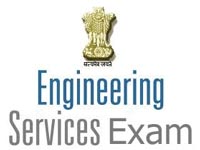 Indian Engineering Services
Indian Engineering Services
I am very eager to write about this exam on the blog,this exam info. was first said by my professor when i was studying btech second year and i am amased by the value given by government to an engineer.
There will be know no better option than this because,u are going to work for your country as an engineer,proud moment for any graduate,common guys take it,feel and arise your passion and patriotism towards your country.
Indian Engineering Services (IES/ES) constitute of engineers that work under the government of India to manage a large segment of public sector economy which constitutes of Railroads, Public works, Power, Telecommunications, etc.
A combined competitive examination is conducted by the Union Public Services Commission (UPSC) for recruitment to the Indian Engineering Services. The Examination constitutes of a written examination followed by an interview for personality test.


The recruitment of qualified candidates are made under the following categories:
Category – I Civil Engineering
(i) Indian Railway Service of Engineers
(ii) Indian Railway Stores Service
(iii) Central Engineering Service
(iv) Military Engineer Service (Building and Roads Cadre)
(v) Central Water Engineering
(vii) Assistant Executive Engineer
(viii) Survey of India Service
Category – I Mechanical Engineering
(i) Indian Railway Service of Mechanical Engineers
(ii) Indian Railway Stores Service(iii) Central Water Engineering Service
(iv) Indian Ordnance Factories Service
(v) Indian Naval Armament Service
(vi) Assistant Executive Engineer (in Ministry of Defence)
(vii) Assistant Naval Store officer Grade I in Indian Navy
(viii) Central Electrical & Mechanical Engineering Service
(ix) Assistant Executive Engineer (in Boarder Roads Engineering Service)
(x) Mechanical Engineer (in Geological Survey of India)
Category – I Electrical Engineering
(i) Indian Railway Service of Electrical Engineers
(ii) Indian Railway Stores Service
(iii) Central Electrical & Mechanical Engineering Service
(iv) Indian Naval Armament Service
(v) Military Engineer Service
(vi) Assistant Executive Engineer (in Ministry of Defence)
(vii) Assistant Naval Store (in Indian Navy)
Category – I Electronics and Telecommunication
Engineering
i) Indian Railway Service of Signal Engineers
(ii) Indian Railway Stores Service
(iii) Indian Ordnance Factories Service
(iv) Indian Naval Armament Service
(v) Assistant Executive Engineer (in Ministry of Defence)
(vi) Engineer in Wireless Planning and Coordination Wing/Monitoring Organisation
(vii) Assistant Naval Stores officer (in Indian Navy)
(viii) Survey of IS
Syllabus
IES exam has some sections like objective type papers in engineering subject
areas subjective papers different based on different engineering streams. IES
is relatively a tough exam as it has a broader syllabus covering the specific
engineering stream in depth.
Paper I (Objective type) - General Ability Test(Part A: General English)(Part B:
General Studies) 200 Marks each
Papers II & III (Objective type) Civil Engineering/Mechanical
Engineering/Electrical Engineering/Electronics & Tele-Communication Engineering
200 Marks each
Papers IV & V (Descriptive) Civil Engineering/Mechanical
Engineering/Electrical Engineering/Electronics & Tele-communication
Engineering200 Marks each
Total marks for written exam - 1000 Marks
Personality TestPersonality test is the personal interview conducted by UPSC. The total marks for interview is 200.
Syllabus of IES
General Ability Test - Paper I Papers II & III (Objective type) Civil Engineering/Mechanical Engineering/Electrical Engineering/Electronics & Tele-Communication Engineering 200 Marks each Papers IV & V (Descriptive) Civil Engineering/Mechanical Engineering/Electrical Engineering/Electronics & Tele-communication Engineering200 Marks eachTotal marks for written exam - 1000 MarksPersonality TestPersonality test is the personal interview conducted by UPSC. The total marks for interview is 200. Syllabus of IESGeneral Ability Test - Paper I
- Part A-General English: It covers English grammar. It helps in understanding the knowledge of candidates in global language.

No comments:
Post a Comment